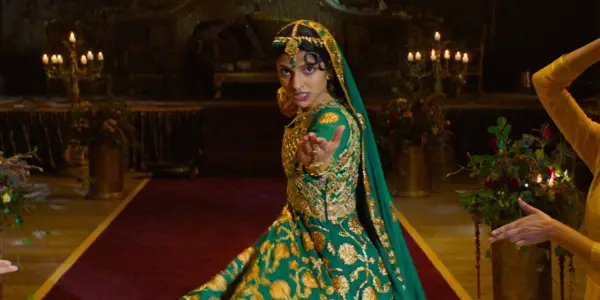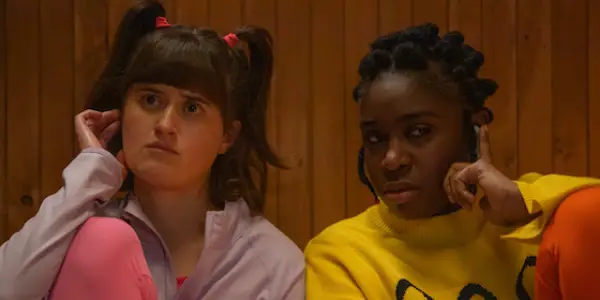POLITE SOCIETY: An Epic Tale Of Sisterhood

Stephanie Archer is 39 year old film fanatic living in…
What is it that continues to draw audiences to the coming-of-age epics of sisterhood relationships? No matter the avenue or the angle, the genre is always ripe for another chance at success. With the epic tale of sisters Ria (Priya Kansara) and Lena (Ritu Arya), Nida Manzoor‘s Polite Society is no exception. A five-part encapsulation of learning to let go, yet always trusting in your roots is as relatable as it is heartwarming. Coupled with sharp and snappy dialogue and undeniable moments of action, Polite Society is anything but polite, demanding for a chance to be seen.
Polite Society
The bar is set high early on, both Ria and Lena are introduced separately, the film building each core and individual characteristic early. Polite Society understands the deeply rooted connection between the sisters, but is aware of the individuality of each as well. While much of what is introduced feels out of context as we do not know Ria or Lena yet, it gives a lived-in and authentic feel as we begin to get to know the sisters further. It also heightens the cultural expectations they both honor and fight back against.

Polite Society begins with the introduction of the sisters separately, but it quickly intertwines both their relationship and struggles. For Lena, she has recently dropped out of art school as she battles with her own self-confidence of her talent as an artist. Ria dreams of becoming the next big stunt double, pushing back against society’s expectations for her to become a doctor. Lena is the core element of Ria’s support system, constantly, albeit reluctantly, aiding in her stunt filming, Ria is an unwavering sense of support, encouraging her sister to embrace the talent she sees so clearly in Lena.
There is a bubble the girls live in, protected by their open-minded parents and the relationship they share. Yet, at various times, the world feels as though it is constantly encroaching, Lena the first to feel the weight of its expectation. As she beings dating Salim (Akshay Khanna), she pulls further away from her journey as an artist and her sister, causing a tumultuous rift that neither is ready for – a rift that could leave each vulnerable to succumb to the will of those around them.
Technically Sound
Immediately, it is the dialogue that hooked me in. It is sharp and snappy, never hanging too long on a moment. The editing matches this spoken pace, keeping the picture moving and feeling like an action film, even when the narrative is laying the groundwork for what is to come. Polite Society constantly feels as though it has a movement, not just visually but physically. This is further heightened by the film’s catching score, always keeping pace yet technically accentuating both movement and feeling. These core elements of filmmaking are brilliantly executed from start to finish and give Polite Society its own surreal and vibrant composition.
Priya Kansara and Ritu Arya are stars in their own right, and I would be lying if I didn’t say how sad I was when the film ended. I wanted to spend more time with Ria and Lena, to see where their story takes each of them next. Arya brings the awkwardness of self-uncertainty in a world dripping with oversaturated expectations. Her Lena exudes the strength of the older sibling, while also balancing the internal conflict her Lena constantly and quietly struggles with. Kansara gives an unforgettable and hypnotic performance. She too carries the awkwardness of Ria well yet in the nativity and struggles of youth. Yet the resilience she imbues in her Ria becomes the film’s undeniable force. The duality of Kansara and Arya works to build an authenticity between the sisters and amongst themselves that delivers the true heart of the film.

Yet, as outstanding as Kansara and Arya are, it is Seraphina Beh and Ella Bruccoleri that steal every scene they are in. Sidekicks to the unrelenting Ria, bring some of the film’s more humorous moments to life without becoming strictly comedic devices. With the performances of Beh and Bruccoleri, and the unexpected evolution of Shona Babayemi‘s Kovacs, Polite Society finds depth in its depiction. This is not just a film of good and bad, heroes and villains, but rather encompassing a broader range of characters, understanding that epics are not executed alone.
Conclusion
This is not to say Polite Society does not have its flaws, yet the heart of the film shines so bright, it is easy to overlook them. Even in the moments where Polite Society reaches unbelievable heights of ridiculousness, it works. From dialogue to performance, from score to editing, Polite Society has a story to tell and is committed until the very end to tell it in the most epic way possible.
Polite Society was released in theaters on April 28, 2023!
Watch Polite Society
Does content like this matter to you?
Become a Member and support film journalism. Unlock access to all of Film Inquiry`s great articles. Join a community of like-minded readers who are passionate about cinema - get access to our private members Network, give back to independent filmmakers, and more.













